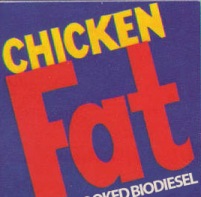Tyson and ConocoPhillips converting chicken fat to fuel

ConocoPhillips, an international, integrated energy company, and meat-processor Tyson Foods Inc., have announced their partnership to produce biodiesel fuel using fat from cows, pigs and chickens.
Production is expected to begin late this year and output is expected to reach 175 million gallons annually.
ConocoPhillips chief executive James Mulva said his company expects to invest about US$100 million on the venture over 3-5 years. Initial production will occur at its Texas plant. Mulva said that the company believes the key to a secure energy future is the development of diverse energy sources.
The finished product will likely be sold in many parts of the US, but the companies didn’t specify where.
The companies said the renewable fuel they will produce is different than biodiesel. While the two fuels use similar feedstocks, such as animal fats and vegetable oils, they each have different processing methods and create chemically different products.
Tyson Foods said it believes that the venture eventually could consume about half the animal fat it produces.
Tyson CEO Richard Bond said he doesn’t believe that using animal fat to produce fuel blends should have a major impact on food prices. He said that if the overall price of fat were to increase, “it would potentially give us the opportunity to pay a little more for livestock.”
“We are firmly committed to leveraging our leadership position in the food industry to identify and commercialise renewable energy opportunities,” said Bond.
Related links:
Related articles:
Chicken-fat fuel factory to open soon
Turkey dung to be used as fuel
For the latest poultry news subscribe here













